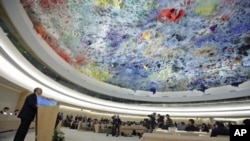The United Nations Special Rapporteur charged with examining human rights conditions in Iran has told VOA that he has found "no positive change of significance" since he took on the mandate in June 2011.
Ahmed Shaheed said in the interview Friday, he remains concerned about the "continuing deterioration" of human rights in Iran. He named the increasing number of executions, and the targeting of human rights defenders and journalists as his top three areas of focus.
Shaheed said in his report to the U.N. that there was an “alarming increase” in executions taking place in Iran, from fewer than 100 in 2003, to 670 in 2011, many occurring after little or no due process.
He said a number of human rights lawyers have been jailed, that there are at least 45 journalists currently imprisoned in Iran, and that many others have fled the country.
Although the Iranian government has refused to work with the Special Rapporteur or allow him to visit the country, Shaheed said he has interviewed 163 witnesses, "individuals who claim they have had their own rights violated or their family members' rights violated." He also has met with members of the diplomatic corps, NGOs [non-governmental organizations] and the Iranian diaspora.
He said of the witnesses, 25 percent live in Iran and included some who are on death row. He did not detail how he was able to speak to people inside Iran, except to say by "electronic means of communication." He said this way, he was able to speak to some who might otherwise have feared talking to him during an official visit.
Shaheed, whose mandate was extended for another year by the U.N., remains hopeful that the Tehran government will allow him access into the country. He said Iran has "not the closed the door."
The Rapporteur plans to "widen the areas of engagement" during his second year on the job. He also hopes to examine "some subjects that the government of Iran is quite concerned about."
He urged Tehran to honor its own constitution and laws, as well as abide by international laws and obligations. He also called for "a moratorium on death penalty," the "release of human rights defenders" and an examination of laws that adversely affect journalists.
News
Special Rapporteur Seeks Change in Iran's Human Rights Conditions




